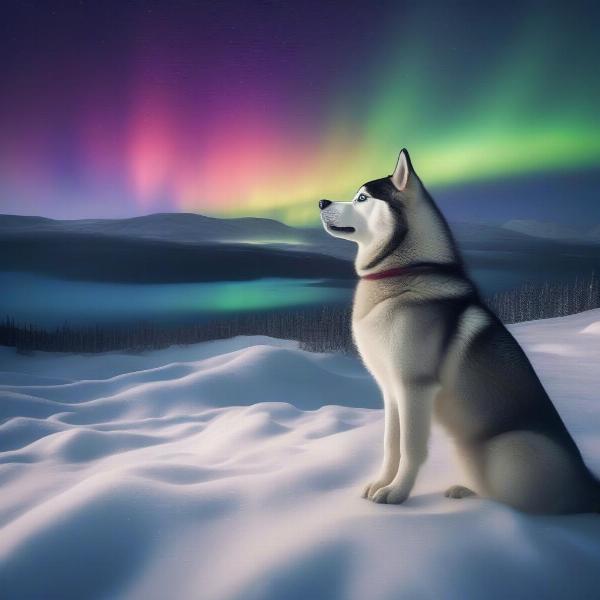The haunting sound of a howling dog echoes through the Alaskan wilderness, a sound deeply ingrained in the culture and landscape of this vast and rugged state. Understanding why dogs howl, particularly in a place like Alaska, gives us a deeper appreciation for their connection to their wild ancestors and their unique way of communicating. While the image of a howling dog Alaska often conjures up thoughts of sled dogs battling the elements, the reasons behind this vocalization are complex and fascinating, applying to dogs of all breeds and backgrounds.
Decoding the Howl: Why Your Alaskan Dog Might Be Vocal
Dogs howl for a variety of reasons, and it’s not always a sign of distress. While it can be a primal call of loneliness or a response to pain, it can also be a joyful expression, a way to communicate with other dogs, or simply a reaction to certain sounds. In Alaska, where the wide-open spaces and natural soundscapes are abundant, these triggers can be amplified.
- Territoriality: Dogs may howl to announce their presence and warn other dogs away from their territory. In Alaska’s sparsely populated areas, this behavior can be more pronounced.
- Loneliness and Anxiety: A howling dog might be expressing feelings of loneliness or anxiety, especially if left alone for extended periods.
- Response to Stimuli: Sirens, music, or even other dogs howling can trigger a howl in your Alaskan companion. The vastness of the Alaskan landscape can often carry these sounds for miles.
- Pack Communication: Howling is a way for dogs to communicate with each other over long distances, something particularly relevant for working dog teams in Alaska.
- Medical Reasons: While less common, howling can sometimes indicate underlying medical issues. If your dog’s howling patterns change significantly, it’s always best to consult a veterinarian.
Alaskan Breeds and Their Howling Habits
Certain dog breeds, particularly those commonly found in Alaska like Alaskan Malamutes, Siberian Huskies, and Alaskan Huskies, are known for their propensity to howl. These breeds were originally bred for their strength, endurance, and ability to work in teams, and howling was an essential part of their communication system.
Is My Dog Howling Too Much?
While howling is a natural canine behavior, excessive howling can be disruptive. If your Alaskan dog’s howling is becoming a problem, consider these tips:
- Rule out medical reasons: A visit to the veterinarian is always a good first step.
- Address anxiety and loneliness: Ensure your dog gets enough exercise, mental stimulation, and companionship.
- Training and behavior modification: Consult a professional dog trainer for guidance on managing excessive howling.
Living with a Howling Dog in Alaska
Embracing the unique sounds of Alaska includes accepting the occasional howl from your canine companion. By understanding the reasons behind this behavior, you can better address any underlying issues and appreciate the connection your dog has to its wild instincts.
 Husky howling under the Northern Lights
Husky howling under the Northern Lights
Conclusion: The Alaskan Howl – A Language of its Own
The howl of a dog in Alaska is more than just a sound; it’s a reflection of the unique bond between these animals and their environment. From sled dogs communicating across vast distances to family pets expressing their joy or anxiety, the howling dog Alaska embodies the spirit of the wild. Understanding the reasons behind your dog’s howling allows you to better address their needs and appreciate the rich tapestry of canine communication.
FAQ:
- Why do Alaskan Huskies howl so much? Alaskan Huskies, like other northern breeds, were bred for communication and teamwork, making howling a natural part of their behavior.
- Is it normal for my dog to howl at sirens? Yes, many dogs react to high-pitched sounds like sirens by howling.
- How can I stop my dog from howling excessively? Addressing underlying anxiety, providing sufficient exercise and mental stimulation, and consulting a trainer can help manage excessive howling.
- Does howling always mean a dog is unhappy? No, howling can be an expression of joy, communication, or a response to external stimuli.
- Are certain breeds more prone to howling? Yes, northern breeds like Alaskan Malamutes and Siberian Huskies are generally more vocal than other breeds.
- Should I be concerned if my dog’s howling pattern changes suddenly? Yes, a sudden change in howling habits could indicate an underlying medical issue and warrants a vet visit.
- Can howling be a sign of territorial behavior? Yes, dogs may howl to mark their territory and warn off other dogs.